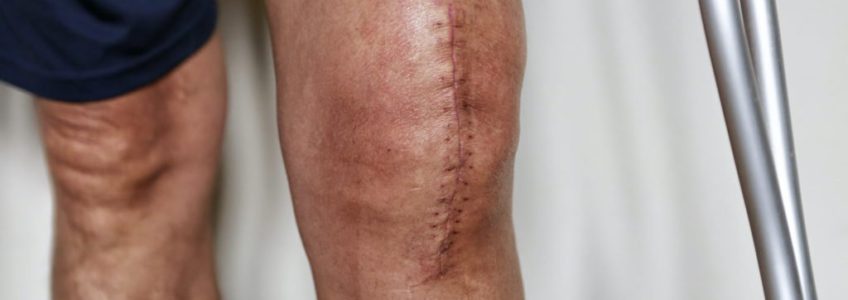
Scars are a natural part of wound healing following injury or surgery to the dermis (the deep layer of the skin). Within two to three days of being injured, the body begins to produce a substance called collagen to fill and repair the defect in the skin. This collagen is laid down in a very disorganized manner, unlike normal collagen that is smooth and organized. This disorganized collagen sometimes prevents normal movement of the skin or even the tissues below the skin. The disorganized collagen commonly appears thick and may even be raised. The scar tissue that forms will change during the next weeks and months until it is fully mature and as strong as the tissue that was present prior to the injury or surgery.
Scars can be minimized to some degree by techniques to soften and smooth them. A newly healed scar is pink or reddish in color and is fragile, unable to tolerate forces for approximately 3 weeks. Light pressure over the healing scar can help the body organize the disorganized pattern of collagen that is initially laid down. It is easiest to manage this scar formation soon after the wound closes rather than trying to flatten a raised scar later. Gentle pressure can be applied with a scar conformer. A scar conformer is a silicone gel sheet that can be purchased from your therapist to wear for a prescribed amount of time to apply this gentle pressure or compression. Custom conformers called otoform or elastomer scar conformers can be used for more mature wounds and are fabricated by a therapist and must be monitored for skin irritation or breakdown.
At about three weeks, the scar is strong enough to tolerate gentle forces such as massage. This management of the scar assists in reducing pain or hypersensitivity, softening and mobilizing the tissue so that structures can glide beneath it to move muscles and joints. As the scar matures, it will lighten in color and become softer. Optimally, the treatment will allow muscle and tendon movement beneath the scar to allow full movement and normal use of the body part.
Problem scars can appear deep purple or red, hard, raised, adherent or “stuck” down, can be itchy, tingly or painful and hypersensitive to touch. Massage can help reduce these symptoms.
Types of Scar Massage:
- Circular Massage: Done with unscented moisturizing lotion using the pad of one’s own finger or thumb to gently massage the scar in a circular pattern. Your fingernail tip color will change from pink to white when applying the correct amount of pressure. You do not want to massage too aggressively as this could cause blistering. Massage is started gently and firmness is increased as the scar becomes more durable.
- Contra-Massage: A firmer massage that is done to reduce adherence or “sticking” of the scar to the underlying structures. Massage is done without lotion and pressure is applied in the opposite direction of the skin’s movement when the joint nearest the scar is moved.
- Cross Friction Massage: Done with lotion and by deeply massaging perpendicular to the direction of the scar.
As the scar matures, and if you find it to be stuck or dimpling when you try to move it with your finger, you may benefit from the use of a material called dycem. Dycem is a nonslip rubber material that gently pulls on the skin surrounding the scar to assist in moving it. You can purchase dycem from your therapist and will be given instruction on the correct usage technique.
Precautions:
- Never massage an open wound.
- Never massage longer than 2-5 minutes per inch of scar as this may cause scar irritation or breakdown of the scar.
- Take precautions to avoid blistering or opening of the scar.
*You may find it beneficial to massage just prior to exercises to prepare the tissue for stretching.
The healing process can often seem long and frustrating for those suffering from scars due to burns, injury or surgery. If you have concerns or questions about your healing process or treatments, our specialists are always willing to help you through recovery.
To learn more about scar management or to schedule an appointment with one of our specialists, call us at 800-698-1280.

